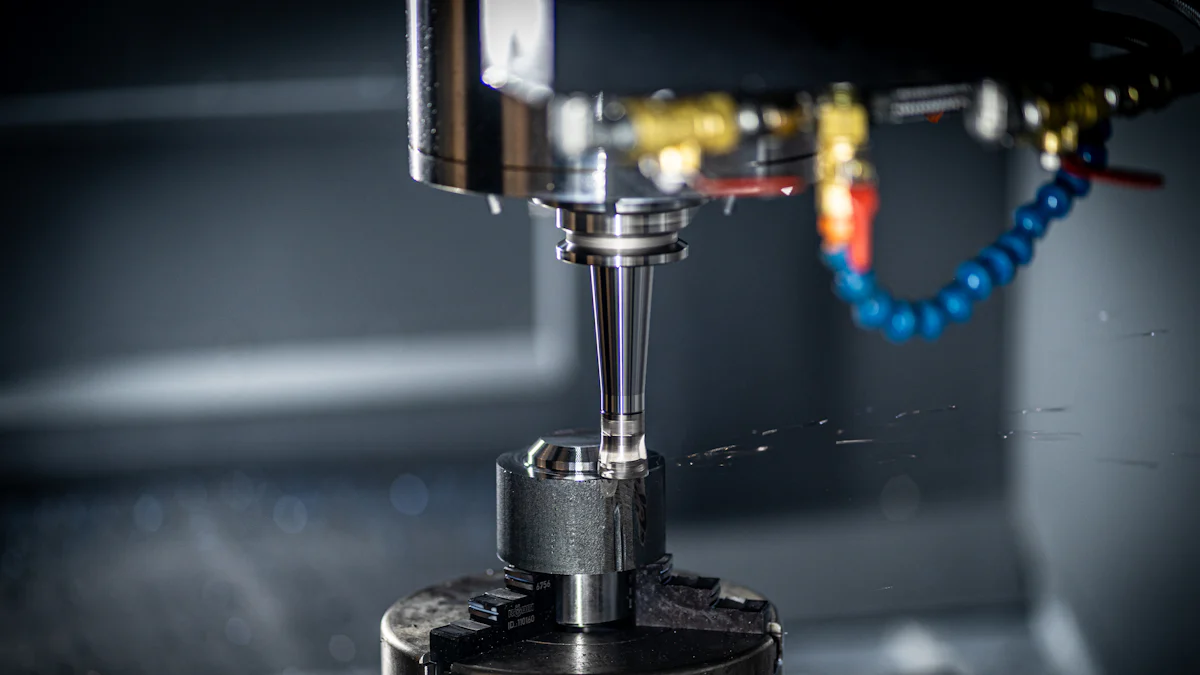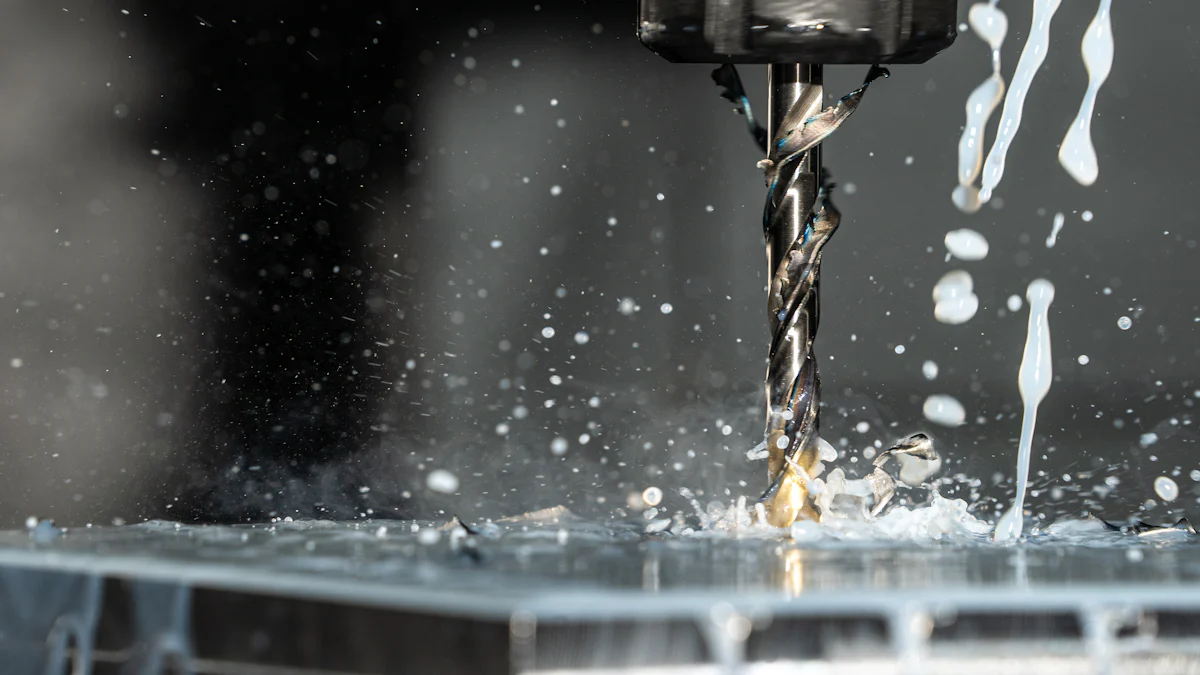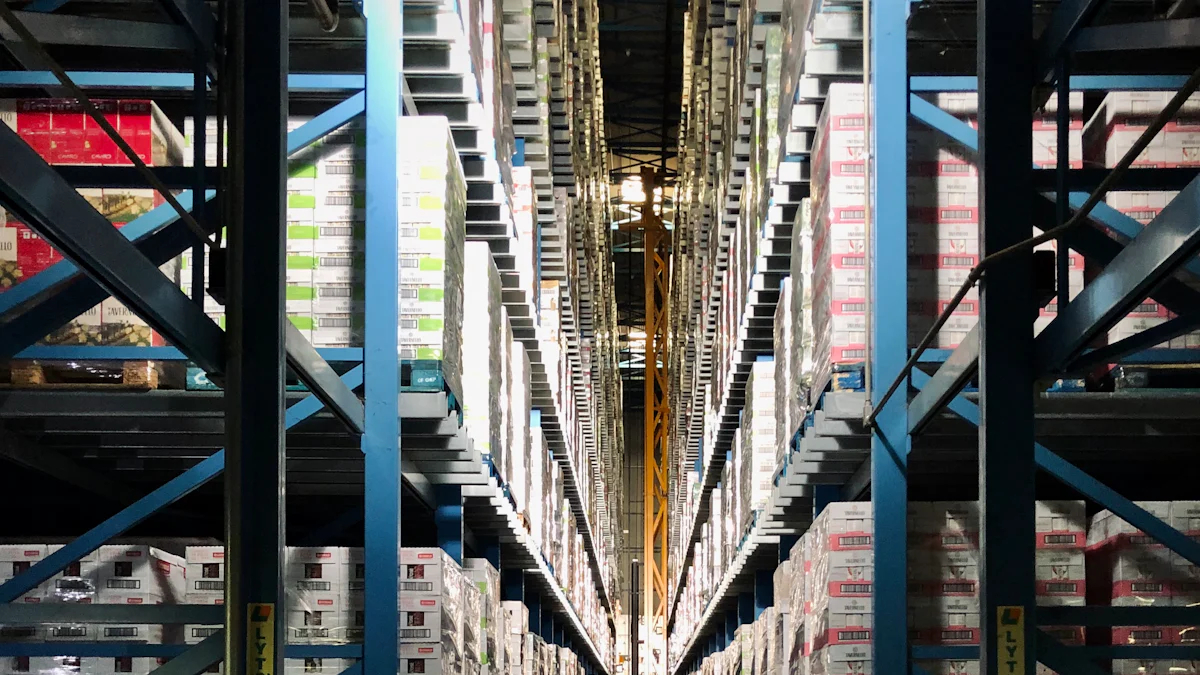Ultimate Guide to Quality CNC Machining Suppliers

In the realm of manufacturing, the choice of CNC machining suppliers holds paramount significance. This guide delves into the crucial aspects surrounding this decision, aiming to equip you with the necessary knowledge for informed selections. Before we embark on this enlightening journey, it is essential to grasp the fundamentals of CNC machining and its widespread applications across diverse industries, including CNC hardware, CNC milling, and CNC custom CNC parts. Understanding these elements will help you select the right CNC service and CNC machining supplier for your needs.
Understanding CNC Machining

When delving into the realm of CNC machining, it becomes evident that this innovative process stands as a pinnacle of precision and efficiency in modern manufacturing. Let's explore the fundamental aspects that define CNC machining and its profound impact on various industries.
What is CNC Machining?
Definition and Basic Principles
The essence of CNC machining lies in its computerized numerical control, where intricate designs are translated into tangible products with unparalleled accuracy. This technology empowers machines to execute precise cuts and shapes on diverse materials such as metal, plastic, wood, and composites. The marriage of digital instructions with mechanical prowess results in the creation of complex components that traditional methods struggle to replicate.
Types of CNC Machines
CNC Router: A versatile machine known for its ability to carve materials like wood, plastic, and metal with utmost precision. It follows programmed instructions meticulously to bring intricate designs to life.
CNC Milling Machine: This powerhouse is adept at creating precise cuts and shapes through rotary cutting tools. Its versatility makes it a cornerstone in industries requiring intricate part production.
CNC Custom Machines: Tailored to specific needs, these machines offer flexibility in design execution, allowing for unique creations that cater to specialized requirements.
Applications of CNC Machining
Industries That Use CNC Machining
Automotive Industry: Embracing CNC machining for the production of intricate car parts with impeccable accuracy.
Aerospace Sector: Leveraging CNC technology for crafting aerospace components that demand uncompromising precision.
Medical Field: Utilizing CNC machines to manufacture medical devices and implants with exacting specifications.
Common Products Made with CNC Machining
Precision Components: Small yet critical parts like gears, shafts, and valves find their genesis through CNC machining's meticulous processes.
Custom Prototypes: From concept to reality, prototypes benefit from the precision offered by CNC technology, enabling rapid iteration and refinement.
Intricate Patterns: Complex patterns etched on various materials showcase the artistic potential of CNC machining in creating detailed designs.
Criteria for Evaluating CNC Machining Suppliers
When assessing CNC machining suppliers, it is imperative to scrutinize their adherence to quality standards and their technological prowess. Let's delve into the key aspects that should guide your evaluation process.
Quality Standards
Certifications to Look For
Seek ISO 9001 certification as a hallmark of exceptional quality management systems.
Emphasize the significance of compliance standards exceeding industry norms.
Ensure suppliers have robust quality control measures in place to guarantee precision.
Quality Control Processes
Implement rigorous quality control protocols to minimize error rates.
Gauge the supplier's commitment to quality processes through advanced inspection techniques.
Highlight the importance of ingraining quality standards in every facet of the working process.
Technological Capabilities
Types of Machines and Software Used
Evaluate the supplier's arsenal, including cutting-edge machines and software tailored for precision.
Opt for suppliers with a diverse range of machines suitable for various materials and complexities.
Innovation and Technological Advancements
Prioritize suppliers who demonstrate a culture of innovation in their technological advancements.
Choose partners that invest in staying abreast of the latest technological trends within CNC machining.
Experience and Expertise
Years in Business
Consider suppliers with a proven track record spanning several years, showcasing stability and reliability.
Prioritize longevity in business as an indicator of experience and adaptability within the industry.
Case Studies and Client Testimonials
Review case studies illustrating successful projects that align with your requirements.
Seek client testimonials that attest to the supplier's professionalism, efficiency, and product quality.
Customer Service and Support
Communication and responsiveness
When evaluating CNC machining suppliers, the aspect of communication and responsiveness plays a pivotal role in ensuring seamless collaboration and timely project completion. Suppliers that prioritize open channels of communication foster transparency and trust, enabling clients to convey their requirements effectively.
To enhance communication, establish clear lines of contact from the onset of the partnership. This proactive approach allows for immediate feedback exchange, addressing any queries or concerns promptly. By maintaining a responsive attitude towards client interactions, CNC machining suppliers can demonstrate their commitment to customer satisfaction.
In terms of responsiveness, timely replies to inquiries and requests are paramount. A supplier's ability to provide swift responses reflects their dedication to meeting client needs efficiently. Moreover, prompt resolution of issues showcases a supplier's agility in handling challenges, instilling confidence in their service reliability.
After-sales support and services
Beyond the initial transaction, reputable CNC machining suppliers offer comprehensive after-sales support to ensure continued client satisfaction. This post-purchase assistance encompasses various services aimed at addressing any issues that may arise post-delivery.
Provide ongoing technical support to address operational queries or troubleshooting requirements. By offering guidance on product usage or maintenance procedures, suppliers empower clients to maximize the longevity and performance of CNC machined parts.
Moreover, facilitate efficient warranty processes for any potential defects or malfunctions encountered after product delivery. Clear guidelines on warranty claims streamline the resolution process, demonstrating the supplier's commitment to product quality assurance.
Finding and Selecting CNC Machining Suppliers

In the quest for CNC machining suppliers, thorough research methods are paramount to ensure optimal selections that align with your project requirements. Leveraging online directories and reviews, alongside industry referrals and recommendations, can provide valuable insights into the reputation and capabilities of potential partners.
Research Methods
Online Directories and Reviews
Explore reputable online directories showcasing a myriad of CNC machining suppliers. These platforms offer a comprehensive overview of various suppliers, allowing you to assess their services, specialties, and customer feedback efficiently.
Delve into customer reviews to glean firsthand experiences and insights into a CNC machine shop's job quality and reliability. Testimonials from previous customers can shed light on a supplier's performance, aiding in determining the best match for your machining needs.
Industry Referrals and Recommendations
Seek recommendations from industry peers or associations familiar with CNC hardware, CNC milling, CNC custom parts, and other specialized areas. Insights from trusted sources can guide you towards reputable suppliers known for their quality craftsmanship and reliable service.
Requesting Quotes and Proposals
Before finalizing your selection of a CNC machining supplier, requesting quotes and proposals is essential to evaluate cost-effectiveness, project timelines, and service offerings effectively.
Information to Provide
When soliciting quotes, furnish detailed information about your project specifications, including material requirements, design intricacies, volume expectations, and desired delivery timelines. Clear communication ensures accurate quotations tailored to your unique needs.
How to Compare Quotes
Compare quotes not only based on pricing but also consider factors like production capabilities, quality assurances, lead times, and additional services offered. A comprehensive assessment of proposals enables you to make an informed decision aligned with your project goals.
Conducting Supplier Audits
To solidify your choice of a CNC machining supplier, conducting thorough audits through on-site visits is crucial in evaluating their facilities, processes, and overall operational excellence.
On-Site Visits
Schedule on-site visits to prospective suppliers' facilities to witness firsthand their manufacturing capabilities, equipment standards, and quality control measures. Observing operations in person provides valuable insights into their production efficiency and adherence to industry standards.
Evaluating Facilities and Processes
Evaluate the supplier's infrastructure layout, workflow efficiency, safety protocols, and workforce expertise during site visits. Assessing the synergy between technology utilization and skilled labor ensures seamless project execution with precision outcomes.
Building Long-term Relationships with Suppliers
Establishing Clear Communication
Setting expectations and requirements
Define clear expectations and requirements from the onset of the partnership to align objectives effectively.
Ensure that communication channels are open and transparent to facilitate seamless collaboration.
Regularly update stakeholders on project progress, milestones, and any potential deviations from the initial plan.
Regular updates and feedback
Provide consistent updates on project advancements, challenges faced, and anticipated timelines for deliverables.
Encourage a feedback loop where all parties can share insights, suggestions, and concerns openly.
Foster a culture of constructive feedback to drive continuous improvement and strengthen the partnership over time.
Performance Monitoring
Key performance indicators (KPIs)
Establish key performance indicators (KPIs) tailored to measure specific project outcomes and supplier performance.
Monitor KPIs regularly to track progress, identify areas for enhancement, and ensure alignment with project goals.
Regular performance reviews
Conduct periodic performance reviews to evaluate supplier adherence to quality standards, timelines, and communication protocols.
Use performance reviews as opportunities for constructive dialogue, goal setting, and mutual growth.
Address any discrepancies promptly through actionable feedback and collaborative problem-solving.
Continuous Improvement
Encouraging innovation and efficiency
Cultivate an environment that encourages innovation by sharing best practices, industry insights, and technological advancements.
Embrace efficiency-driven initiatives such as process optimization, waste reduction strategies, and automation integration.
Collaborative problem-solving
Approach challenges collaboratively by engaging in proactive problem-solving discussions with suppliers.
Leverage collective expertise to address issues promptly, implement effective solutions, and prevent recurrence.
Foster a culture of shared responsibility where both parties contribute ideas towards enhancing processes and achieving mutual success.
In summary, the journey through selecting quality CNC machining suppliers has unveiled essential considerations for optimal choices.
Diligence in vetting suppliers ensures precision and reliability in your manufacturing endeavors.
Cultivating enduring relationships with chosen partners fosters mutual growth and efficiency.
Embrace the advantages of collaborating with reputable CNC machining suppliers for sustained excellence.
See Also
Exploring Precision Manufacturing with CNC Machining Services
Efficient Precision Manufacturing through CNC Machining Services
Optimizing Precision Manufacturing via CNC Machining Services
Comprehensive Overview of CNC Milling Services for Precision Manufacturing
Achieving Precision Parts Manufacturing Excellence with CNC Machining
About US
Follow Us
Your prototype holds unparalleled significance, and we deeply value its uniqueness. Collaborating with you during the preparation phase for running your prototype or parts is a commitment we gladly embrace. Whether it's a single part or a complex assembly, we are dedicated to selecting the optimal tools and pathways to bring your envisioned product to life.
At Precision Fab CNC Machining, we specialize in producing parts for prototypes, short runs, and high-volume production. Our prototyping machine capabilities extend across metal, plastic, and wood machining, with welding fabrication services available to complement and finalize your prototype if required.
Address
Address: Room320 10F, Building A,Nanshan international building, Dayawan District, Huizhou, Guangdong, 516001 China
Contacts
billy@timaycnc.com

